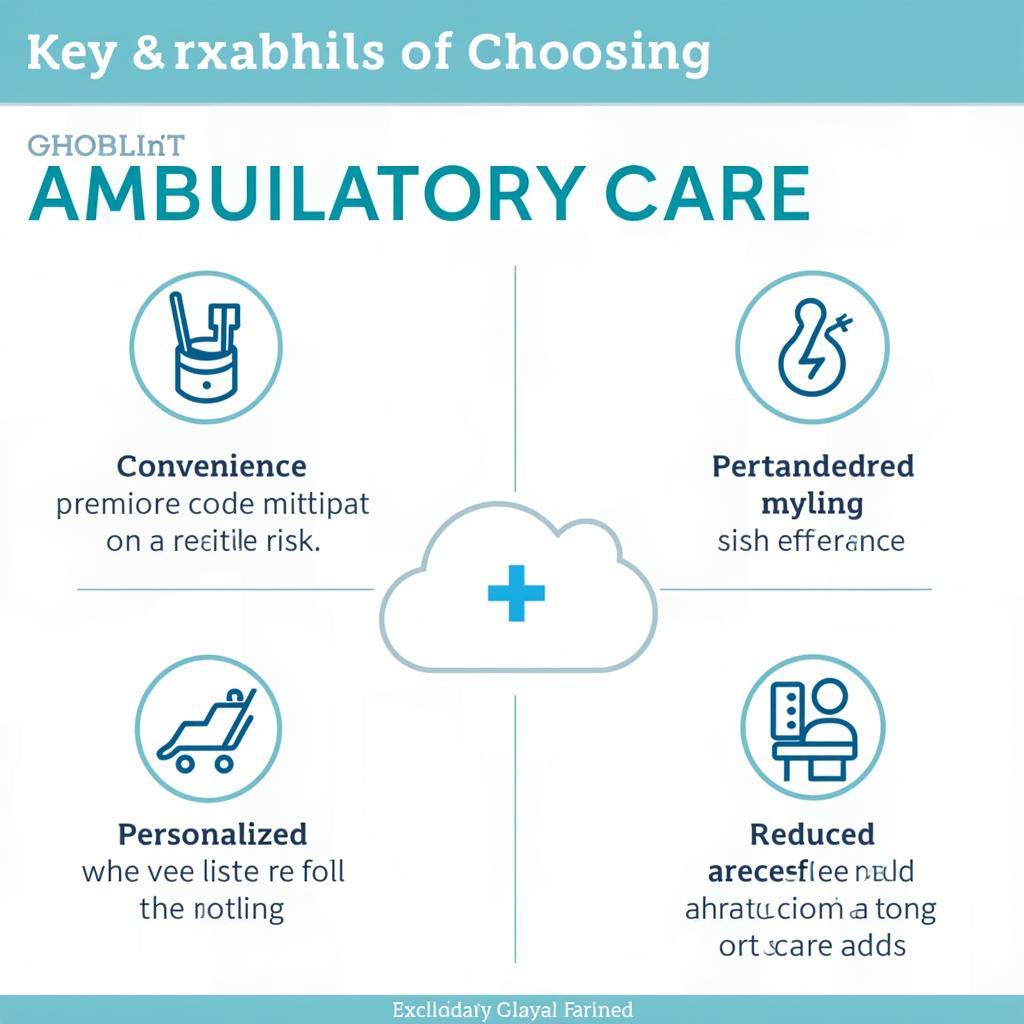What Are Ambulatory Care Services?
Ambulatory care services refer to medical care provided on an outpatient basis, meaning you don’t need to stay overnight in a hospital. These services cover a wide range of medical needs, from routine check-ups and minor illnesses to specialized treatments and diagnostic procedures. Understanding what ambulatory care services encompass can help you navigate the healthcare system more effectively and choose the best option for your needs.
Understanding the Scope of Ambulatory Care Services
Ambulatory care is a cornerstone of the modern healthcare system, offering convenient and cost-effective solutions for many health issues. It’s often the first point of contact for patients seeking medical attention, providing preventative care, diagnosis, and treatment for a variety of conditions. Think of it as healthcare services you receive without being admitted to a hospital. This includes everything from a quick visit to your family doctor to specialized treatments at a clinic. The flexibility of ambulatory care services allows patients to receive necessary medical attention while maintaining their daily routines.
Different Types of Ambulatory Care Facilities
Ambulatory care services are delivered in a variety of settings, each catering to specific needs. These include:
- Physician Offices: These are the most common type of ambulatory care facility, offering routine checkups, vaccinations, and treatment for common illnesses.
- Urgent Care Centers: These facilities provide immediate care for non-life-threatening injuries and illnesses when your regular doctor is unavailable.
- Specialty Clinics: These clinics focus on specific medical areas, such as cardiology, dermatology, or oncology, providing specialized expertise and treatments.
- Outpatient Surgery Centers: These centers perform surgical procedures that don’t require an overnight hospital stay.
- Diagnostic Imaging Centers: These facilities offer various imaging services, including X-rays, CT scans, and MRIs, crucial for diagnosis and treatment planning.
- Dialysis Centers: These centers provide life-sustaining dialysis treatments for patients with kidney failure.
 Various Ambulatory Care Settings
Various Ambulatory Care Settings
Benefits of Ambulatory Care Services
Ambulatory care offers numerous benefits for both patients and the healthcare system.
- Convenience: Appointments are often easier to schedule and require less travel time compared to hospital visits.
- Cost-effectiveness: Ambulatory care is generally less expensive than inpatient hospital care, saving patients money.
- Reduced Risk of Hospital-Acquired Infections: Because you’re not staying in a hospital environment, the risk of contracting infections is significantly lower.
- Personalized Care: Ambulatory care settings often allow for more personalized attention and interaction with healthcare providers.
- Faster Recovery: For many procedures and illnesses, recovery time is shorter with ambulatory care.
Why Choose Ambulatory Care?
Choosing ambulatory care can be a smart decision for a range of medical needs. If you have a minor illness, require a routine checkup, or need a specific diagnostic test, ambulatory care provides a convenient and efficient option.
 Reasons to Choose Ambulatory Care
Reasons to Choose Ambulatory Care
How to Access Ambulatory Care Services
Accessing ambulatory care is typically straightforward. You can often schedule appointments online or by phone. Many facilities also accept walk-in patients, particularly urgent care centers.
Finding the Right Ambulatory Care Provider
Finding the right provider involves considering your specific needs and preferences. Researching different facilities, reading patient reviews, and checking with your insurance provider can help you make an informed decision.
“Finding the right ambulatory care provider is essential for effective healthcare. Don’t hesitate to ask questions and choose a provider you feel comfortable with,” advises Dr. Emily Carter, MD, Family Medicine Physician at City Health Clinic.
 Accessing Ambulatory Care Services
Accessing Ambulatory Care Services
Conclusion
Ambulatory care services play a vital role in providing accessible, affordable, and efficient healthcare. Understanding what ambulatory care encompasses and the various services it offers can empower you to make informed decisions about your health and well-being. By utilizing ambulatory care services effectively, you can access the medical care you need while maintaining your daily life.
“Remember, preventative care is crucial. Regular checkups and screenings at ambulatory care facilities can help detect and manage potential health issues early on,” adds Dr. Michael Davis, MD, Internal Medicine Specialist at Metro Health Center.
FAQ
- What is the difference between ambulatory care and inpatient care?
- What types of procedures are performed in outpatient surgery centers?
- How do I find an ambulatory care center near me?
- Are ambulatory care services covered by insurance?
- What should I bring to my ambulatory care appointment?
- Can I receive specialized care in an ambulatory setting?
- What if I need follow-up care after my ambulatory visit?
For further assistance, please contact us via WhatsApp: +1(641)206-8880, Email: [email protected] or visit our office at 456 Oak Avenue, Miami, FL 33101, USA. Our customer service team is available 24/7.

